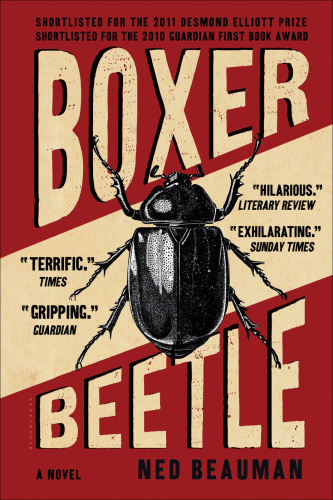
Boxer, Beetle
A Novel
- اطلاعات
- نقد و بررسی
- دیدگاه کاربران
نقد و بررسی

Starred review from June 27, 2011
This 2010 Guardian First Book Award finalist uses current day London resident Kevin "Fishy" Broom, who collects rare Nazi paraphernalia (though is "not a secret Nazi" himself) and is distinguished by an unfortunate genetic defect that leaves him smelling strongly of rotting fish, as a frame through which to contain an ebullient and thrilling narrative. The heart of the story is the unlikely connection between a beetle-obsessed entomologist, eugenicist, repressed homosexual, and fascist Philip Erskine, and "Sinner" Roach, a nine-toed, 4-ft. 11-in., sadistic, alcoholic Jewish boxer. Doing a favor for a friend, Fishy discovers a murdered man and the prize he'd hidden for years: a note from Hitler thanking Dr. Erskine for his "kind tribute." This auspicious beginning plunges the novel into East London, mid 1930s, where it largely remains, save for a few brief returns to the present involving Fishy's kidnapping by a Welsh Nazi cultist and their investigation of Erskine's past. Though Beauman bites off a lot to convincingly chew and fumbles the odd simile, his novel is irreverent, profane, and very funny. Best of all, he writes prose that, like Chabon's, has the power to startle, no small feat in a debut.

August 15, 2011
Many adjectives come to mind when describing Beauman's debut novel, but "strange" surely applies. Readers may feel compelled to shower after taking in this satiric tale (both funny and repellent) of fascism, eugenics, boxing, entomology, sex and murder.
Kevin Broom suffers from trimethylaminuria, a rare genetic condition that makes him smell like rotten fish, so he mostly spends his days in his London flat collecting Nazi memorabilia online. But he stumbles on a crime scene that takes the story back to the 1930s with Hitler in ascendance and some British holding him in awe. Broom learns about a five-foot-tall, nine-toed, hard-drinking Jewish homosexual boxer, appropriately named "Sinner" Roach, whose death in the 1930s is even uglier than his life. A eugenicist who wants to study him has previously focused on insects to learn whether he can breed undesirable traits out of them. (Think Aryan beetles.) The story wonderfully mocks eugenics and fascism, while the writing bursts with imaginative metaphors. For example: "Silkstone was a cheerful burly man whose laughter could have torn the stitches out of a straitjacket." Or: "Twelve-year-old Millicent had so many freckles that Erskine wondered if she had stolen some from other children." Unfortunately, the novel has no oases of sanity or likability, no character to care about or wish well. Millicent likes to burst into a room and breathlessly accuse people of perverse sex acts, but no one pays attention to her since she doesn't even understand her own words. Meanwhile, who cares whether Broom solves the mystery or whether Erskine unearths the secrets of racial purity or whether Sinner will become the flyweight boxing champion. Who cares who is buggering whom, and in what graphic detail?The only truly interesting question is how Sinner dies.
If Franz Kafka had a sense of humor, perhaps he would have written a book like this one: quirky, comical, brilliant and, somehow, ultimately disagreeable.
(COPYRIGHT (2011) KIRKUS REVIEWS/NIELSEN BUSINESS MEDIA, INC. ALL RIGHTS RESERVED.)

August 1, 2011
Kevin "Fishy" Broom, so nicknamed because he smells like rotting fish, deals online in Nazi memorabilia. He finds his job a bit more dangerous than he'd anticipated when he's kidnapped to help find the remains of a World War II-era Jewish, homosexual, nine-toed boxer. In the process, he uncovers a treasure trove of history and its artifacts and personages, including entomologist Philip Erskine, who hopes to breed a superbeetle in tribute to Reich Chancellor Hitler. Erskine, who has a darker interest in eugenics, became interested in the hapless boxer. First novelist Beauman has created a romp across the decades, with quirky characters and a complex, darkly humorous story. The one drawback: explicit sex scenes that seem gratuitous, not contributing much to moving the story to its conclusion. VERDICT Shortlisted for both the 2010 Guardian First Book Award and the 2011 Desmond Elliott Prize, this book will appeal to readers of offbeat fiction, especially those with an interest in the World War II era.--Joanna M. Burkhardt, Univ. of Rhode Island Libs., Providence
Copyright 2011 Library Journal, LLC Used with permission.

Starred review from August 1, 2011
Kevin Fishy Broom collects Nazi memorabilia and doesn't go out much; he has a rare genetic disorder that causes him to smell like rotting seafood. But he runs an errand for an important Naziana collector, discovers a murdered man, and realizes that the murder must involve a priceless Nazi relic. Soon, he's menaced by a remarkably well-mannered Welsh assassin bearing a tattoo honoring a nineteenth-century German secret society whose Aryan mythologies helped inspire the Nazis. That said, most of the book takes place in mid-1930s England. Philip Erskine, a repressed-gay, upper-class twit who fancies himself a eugenicist, is drawn to a diminutive but brutish Jewish boxer known as Sinner Roach. WWII looms, British Fascists are on the march in London's East End, and Erskine's titled father is hosting a conference on fascism while attempting to drum up support for his invented language. First-novelist Beauman, who is just 26 years old, has concocted a bizarre and funny mystery that is filled with eccentric scholarship. His characters are all essentially repulsive, but Beauman's style and humor render them bearable and even memorable. Boxer Beetle may be too great a stretch for crime fans who lean toward the conventional, but those seeking something completely different will be amply rewarded.(Reprinted with permission of Booklist, copyright 2011, American Library Association.)




دیدگاه کاربران